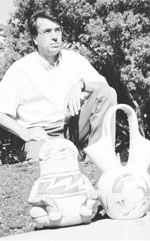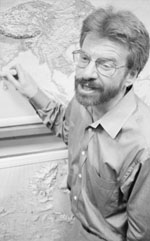Faces & Names
A look at the people who bring life to the university
Thomas Guderjan
ever the kind of kid who collected rocks and arrowheads, Thomas Guderjan, professor of anthropology at TCU, said his passion for learning about the past still lies elsewhere.
“Trying to understand a society in which you cannot talk to anyone, and trying to gain insight to something 2,000-years-old is like the ultimate unsolvable puzzle,” Guderjan said.
 Guderjan,
director of the Maya research program which sponsors excavations in the
ancient community of Blue Creek in northern Belize, has been doing fieldwork
there for nearly 10 years.
Guderjan,
director of the Maya research program which sponsors excavations in the
ancient community of Blue Creek in northern Belize, has been doing fieldwork
there for nearly 10 years.
Guderjan said the main purpose of the program is to understand what a Mayan city is all about.
Every year, Guderjan leads four two-week sessions in Blue Creek, which attract students and faculty from all over the world.
Guderjan said the groups dig around in ancient residences in a 65 square mile radius to try to find out when and how the people lived.
“Each person deals with a piece of the puzzle and I try to keep the pieces integrated,” Guderjan said. “We have only begun to scratch the surface.”
One of the reasons Blue Creek stands out as an excavation site, Guderjan said, is the staggering amount of jade in the area.
In 1995, Guderjan’s team discovered the third largest cache of jade artifacts ever found.
“We are trying to find out what makes that place so different and special,” Guderjan said. “It is certainly not the size.”
Guderjan said TCU students will benefit because the program is becoming one of the largest and most important research programs in Latin America.
“TCU students will be able to go to Blue Creek and later have the possibility of being supported in their careers by having research underwritten,” Guderjan said.
There are plans for a month-long field school in Blue Creek in which TCU students can earn credit toward their degree, Guderjan said.
Currently, there is not an anthropology major at TCU, but Guderjan said that is why he and Miguel Leatham, assistant professor of anthropology, were brought to TCU this semester.
Guderjan said the administration has been supportive and is moving fast, and he hopes students will have the option of majoring in anthropology by the spring semester.
Leatham, who specializes in cultural anthropology, said this is a time of long-awaited growth and change in the anthropology department.
Besides adding an anthropology major, a Mexican-American studies component will also be added to TCU courses this spring, Leatham said.
“There has been a longing for these type of courses by Mexican-American students, and it is great that they soon will be represented on campus,” Leatham said.
William Bedford, a junior history major, said he is excited about the
presence of Guderjan and Leatham in the department, and said he has been
among the students waiting for the opportunity to major in anthropology.
“I have been waiting for two years to have an actual field archaeologist
come to TCU,” Bedford said. “I totally enjoy Guderjan’s
class.”
Bedford said he plans to go to Blue Creek next summer.
“I’ve been told that after the first day at field school, you will know if it is something you want to do for the rest of your life,” Bedford said. “It will be good for me to do it while I still have options.”
Guderjan said his biggest pleasure at TCU is the quality of the students.
“On the first test I gave, the students exceeded my expectations,” Guderjan said. “At Saint Mary’s University (in San Antonio), I would have had an array of normal grades on the same test.”
Guderjan said he appreciates the amount of feedback from students in the classroom.
“Most importantly, with the implementation of an anthropology major, I am in a position where I can build something for the future,” Guderjan said.
Natascha Terc
natascha@nementerc.com .
Faces & Names
A look at the people who bring life to the university r
Rhonda Hatcher
Her mother never graduated from college. Her father received his undergraduate degree at 35, and he was the first of his family to graduate from high school. No one knew what path the young woman from Colorado would follow, not even herself.
Now, 13 years after earning a Ph.D. from Harvard University, Rhonda Hatcher, the recipient of this year’s Chancellor’s Award for Distinguished Teaching, works to maintain her successful life at home and in the classroom.
“I don’t come from a traditional academic background family,” Hatcher said. “(My parents) were both raised on farms: they are not math people in the least. I took a big jump to get a Ph.D.”
Armed with her doctorate degree, Hatcher now lives the roles of an active
mother, wife and associate  professor
of mathematics. She raises two children, Nolan, 14, and Alex, 11, with
her husband, George Gilbert. In the classes she teaches, she is responsible
for 56 students.
professor
of mathematics. She raises two children, Nolan, 14, and Alex, 11, with
her husband, George Gilbert. In the classes she teaches, she is responsible
for 56 students.
“I have two focuses,” Hatcher said. “My children and teaching are two separate worlds for me. But I view my students as my children because I’m responsible for both, so I’m very careful to make sure I do those things well.
“That’s why sometimes my car just doesn’t get washed or why the housework doesn’t get done. But in the big picture, it’s pretty well-balanced. I just don’t sleep very much.”
Smiling, laughing and providing a casual atmosphere is what she said
is part of her secret to good teaching.
“The question is, how do you get students to understand (mathematics)?
A lot of that has to do with personality,” Hatcher said. “I
probably have much more of an outgoing personality than they expect and
a sense of humor.”
Her students said they find her charisma to be an essential part of her style.
Lyndsey Blott, a senior mathematics major, said Hatcher not only teaches, but also makes students want to learn.
“She finds creative and innovative ways to teach,” Blott said. “She’s always there for her students, and she always goes out of her way (for us).”
Blott said Hatcher makes an effort to treat all her students equally and always extends a genuine eagerness to help them.
Just as her students find Hatcher’s personality beneficial, her husband said it was a part of his attraction to her when he met her at Harvard.
Gilbert, also an associate professor of mathematics at TCU, said when they first met, she came across as very friendly and she hasn’t changed since then. He said he has come to appreciate her focus and motivation in both her job and family life.
“Trying to work and take care of home life is a hard balancing act,” Gilbert said.
Hatcher said her relationship with her husband is professional and personal.
“We met at Harvard and took our jobs together,” she said. “It’s fine (to work closely) because we’re really independent of each other. We’ve co-authored papers and co-authored books together. It’s pretty convenient, and it works fine.”
Hatcher and Gilbert’s co-authored textbook is used in the topics
of mathematics course offered at TCU.
Even though both parents are mathematics professors, Hatcher said she
wants her children to be involved with what interests them.
“(Nolan and Alex) know what we do, and it doesn’t affect them,”
she said. “We don’t pressure them to be math people. They’ll
just become whatever they want to become.”
Keeping in mind her image as a mother-professor, Hatcher said she feels students relate to her well because she does not fit the stereotypical professor mold.
“I break barriers,” she said. “I’m a woman. I don’t think that’s quite what (students) had in mind. I think that makes them more comfortable, especially women.”
Hatcher said her personality is not characteristic of what students would expect, and she can gauge pretty well where students are in the material. She said part of what makes her a good teacher is her ability to understand why her students don’t understand.
“I’m not the stereotypical professor, and I don’t want to be,” Hatcher said.
Mark Lewis
m.e.lewis@student.tcu.edu.
Faces & Names
A look at the people who bring life to the university r
Arturo Flores
Most children dream about what their future job may be. Arturo Flores, associate professor of Spanish and Latin American studies, grew up and turned his dream into a reality.
“Since I was a little boy, my dream was to be a teacher,” he said. “When I was 10, I remember my composition. The teacher said to write down what you want to be.”
When Flores visited the same teacher before venturing into his career, he said she remembered his letter and she knew he would achieve his childhood goal.
 Flores
was born and raised in Chile, received a bachelors degree in Spanish Literature
and, after making the decision to move to the United States, completed
his masters degree at Arizona State University. He went on to attain his
Ph.D. at the University of Arizona.
Flores
was born and raised in Chile, received a bachelors degree in Spanish Literature
and, after making the decision to move to the United States, completed
his masters degree at Arizona State University. He went on to attain his
Ph.D. at the University of Arizona.
With these credentials, Flores taught Chicano Studies and Spanish at the University of Wisconsin at Whitewater. Shortly after he began his job there, he came to TCU, and has been teaching in the Spanish department for 15 years.
Flores believes he has paid a high price for his success, considering the death of his father.
“My father was a mechanical engineer, and (he) always wanted me to do the same,” he said. “He was very upset when I told him I was going to teach. I think it was very hard for him, and he never ever forgave me.”
In addition to deciding not to follow in his father’s footsteps, Flores left the country to pursue his goal.
“I think I lost him in a way then too,” he said. “In 1988, when I was ready to go, he was sick. It was hard for me because I couldn’t arrive there on time, and he died before I saw him.”
Flores knows the decisions he made were against his father’s wishes, but he knows deep down his father was proud of him.
“I know he always wanted the best for me,” he said. “My mother told me that he was very proud of me, even though he never said anything.”
Although Flores’ relationship with his father was never the same after the decision was made, Flores knew it was the best scenario for him. He knew what he wanted to do and that he would excel at his passion.
“It is not a sad story because I’m proud of who I am,” he said.
Senior Spanish major KK Kageler appreciates the concern Flores exhibits for his students.
“He is real personable and he gets to know the students really well,” Kageler said. “He is definitely more like a friend than a teacher.”
Flores goes the extra mile to show concern for his students because he was once a college student and can relate to the issues that accompany this stage of life.
“I think it is very difficult for young people,” he said. “There are a lot of distractions.”
Kageler believes Flores goes out of his way to help his students, and feels as if she can talk to him about more than Spanish.
“He is just really helpful with everything,” she said. “Not only will he help me with work from other classes, but we can talk about things outside of class, like life-related issues.”
While he understands the temptations of college life, Flores advises students to keep their eye on their goal by making positive choices — and following their dreams.
“You have to make good decisions,” he said. “Sometimes you make the wrong decisions and it takes a long time to just get back to the right track. What everyone needs is to focus and I really believe you can be whatever you want to be.”
Kristin Delorantis
kdelo@hotmail.com.
Faces & Names
A look at the people who bring life to the university
Jeffrey Roet
Teaching geography is more than just a job for geography lecturer Jeffrey Roet — better known as Dr. Jeff. It’s his life.
“It’s my hobby, my profession — I don’t separate it from play and my personal life,” Roet said, while pointing to the picture on his desk of his 4-month-old daughter, Jordana, holding a globe. “Even my wife is a geographer.”
Roet’s fascination with geography began when he was 19 after a friend inherited $300,000 and bought him a round-trip ticket to India. He stayed for a year, and became interested in the relationship between transportation and cities.
Since his trip to India, Roet has traveled to every continent except
Antarctica. His trips aren’t vacations,  however.
however.
“(My wife and I) travel as geographers doing research, learning about places so I might be a better classroom professor,” Roet said. “I bring that expertise and experience to the classroom because I’ve been there and asked people questions about life in that country.”
One of Roet’s trips was an “adventure” in Botswana.
“My wife and I rented a car and traveled through African villages meeting people, learning about their lives and how they practice agriculture before going on a safari in the Okavango Delta,” Roet said.
During another trip, Roet and his wife hopped onto a bus, whose destination was unknown to them, rode deep into the mountains of Venezuela, and got off at a village, not knowing how they were going to get out of the mountains. There, they met Sister Ana Maria, a nun who befriended them and showed them the ways of the people. She still keeps in contact with them.
“We never would have met her and learned what the people were like if we never got on that bus,” Roet said. “The idea is to get off the beaten path. The idea is to explore.”
Laura Berry, sophomore English major, enjoys Roet’s classes because of his “extreme enthusiasm about geography.”
“You come into his class and you can’t help but be excited about what you’re going to learn,” Berry said. “He’s so passionate about geography that you have to smile and laugh and stay awake. He helps you put geography into everyday life.”
Suzanne Keck, senior history major and geography minor, said Roet puts more of his time into teaching then he has to.
“He takes the time to analyze the students’ abilities and point them in a good direction,” Keck said. “He tries to match them up with a possible career choice suited to their abilities.”
Berry also said Roet is helpful to his students.
“He’s there for you whenever you need him,” Berry said. “He gives you utter support. For instance, with the (geography) minors, he’s taken us to his house in Dallas for dinner and he lets us know that with the minor program, our ideas are important. He shows us what we could do in life as geographers.”
Benjamin Tillman, assistant professor of geography, who is in his first year of teaching at TCU, said Roet has been helpful to him as a new professor.
“He’s given me background about TCU culture and the students here,” Tillman said. “He’s willing to be helpful, so that makes me feel welcome. The positive attitude that he always has is nice.”
Roet also likes to take his students on field trips.
“The only way to understand geography is to travel,” Roet said. “More and more, I’ll be taking students to other parts of the world as America becomes less geocentric.”
Roet and Tillman are taking a group of students to Mexico City during Fall Break next weekend.
Keck and Berry, who are in Roet’s urban geography class, are excited about the trip.
“We’ll be learning about problems the people are facing and possible solutions,” Keck said.
Berry and Keck also went on a trip to San Antonio with Roet.
“He teaches you all the unknowns about the city,” Keck said. “He showed us how the Spanish cultivated their farms and divided the water supply among the city’s five missions.”
Roet, who has taught at several other schools, including Rice School of Continuing Studies, enjoys teaching at TCU.
“There’s a wonderful sense of community here that other places just don’t have,” Roet said.
Sarah McClellan
sarahlmac@hotmail.com.